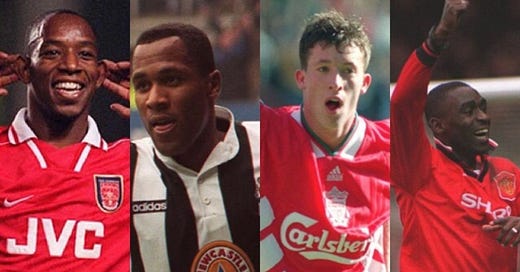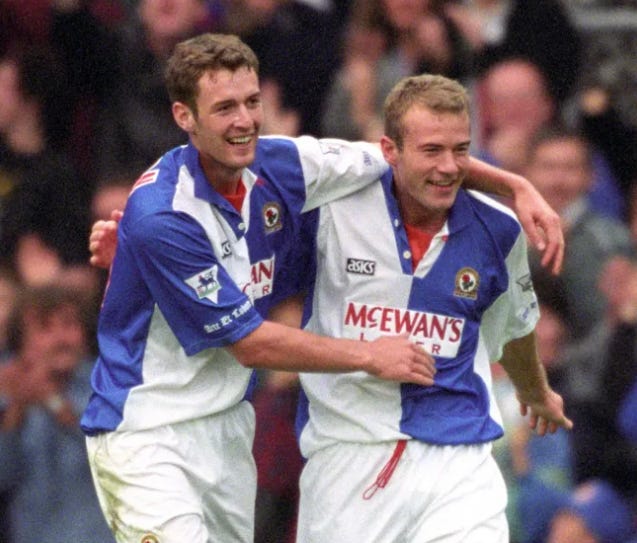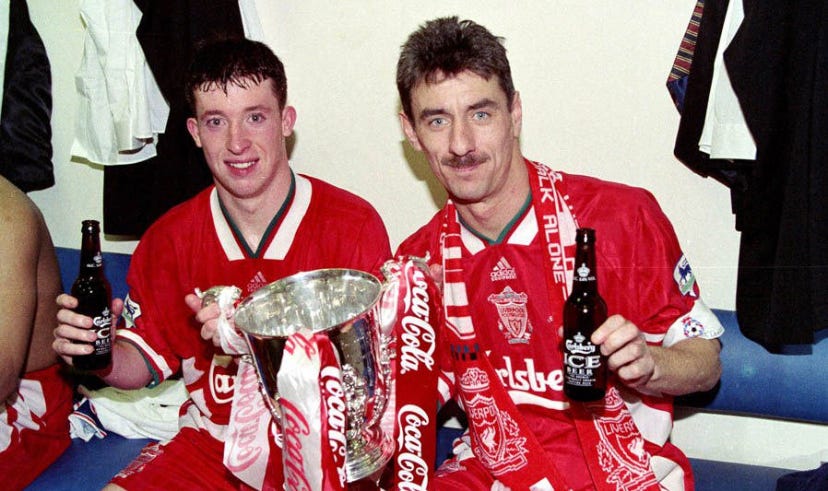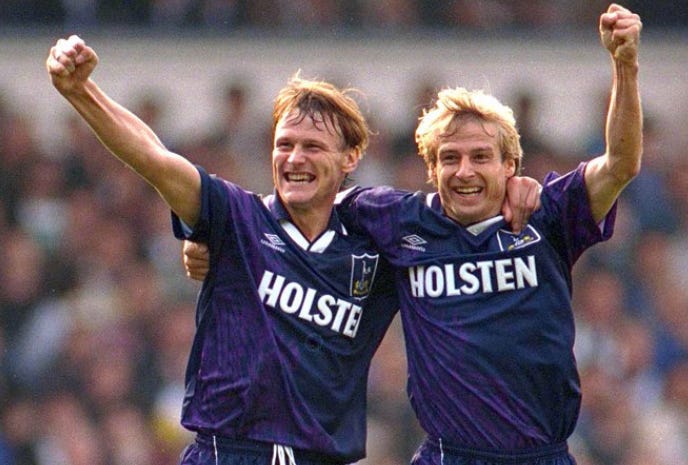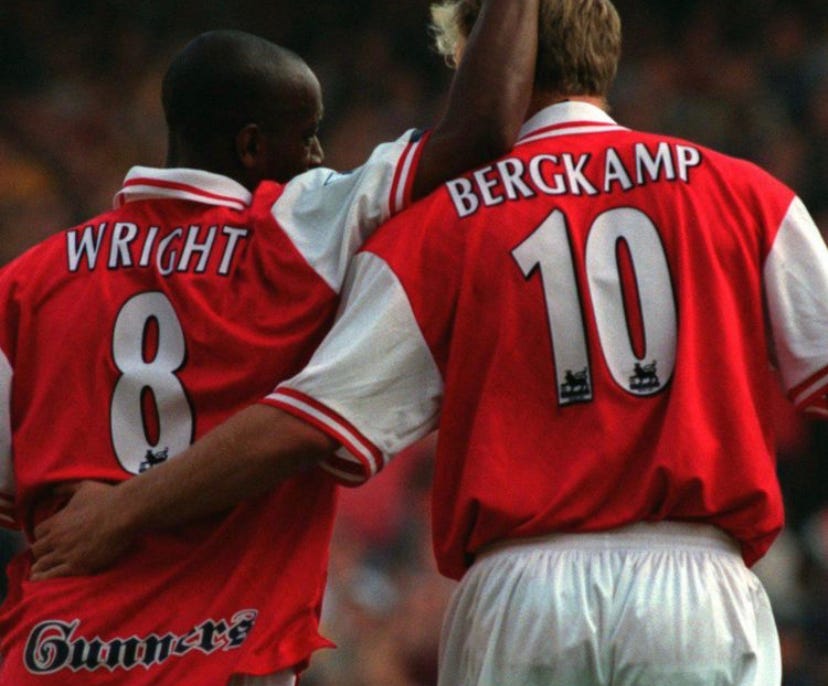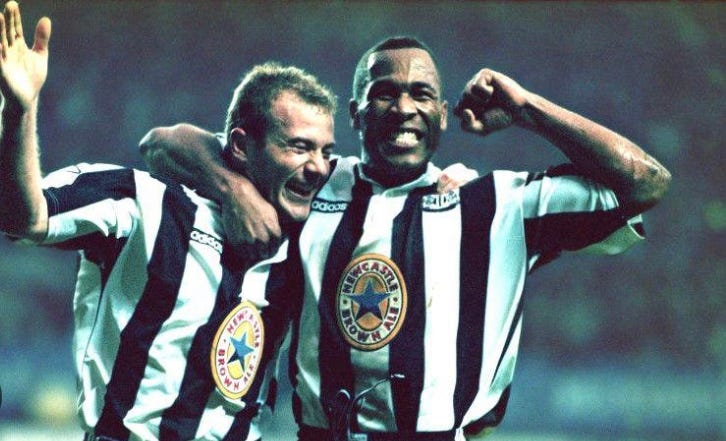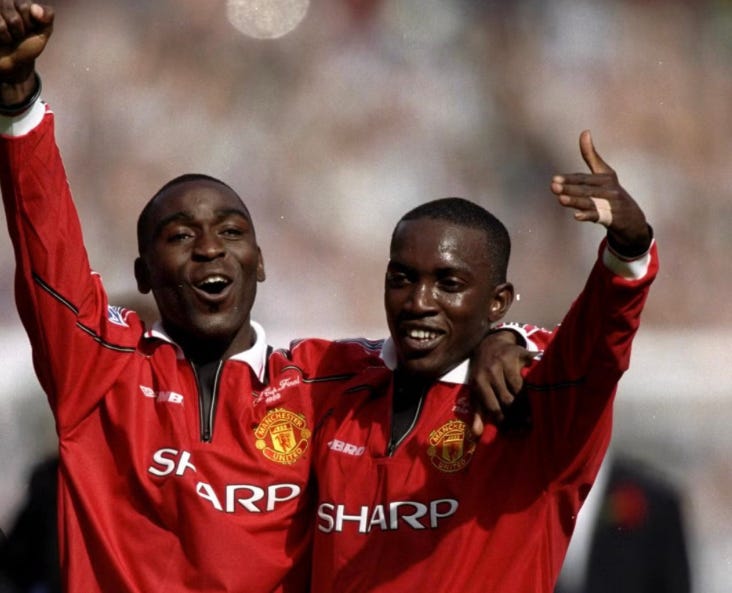Better Together (Part 1)
A look at the most dominant strike partnerships of the early days of the Premier League
Better Together
Over the past ten years or so, Liverpool have made a habit of having destructive forward lines; players who can hit you at pace, move the ball around and then finish in a huge variety of ways. The players have changed over time and have included Premier League greats such as Sadio Mane, Roberto Firmino and, of course, Mo Salah, but whatever the combination, they have still always managed to strike fear into opposition defences.
This season’s incarnation is no different, with Salah being joined by Cody Gakpo and Luis Diaz in scoring regularly, Diogo Jota, when fit, always providing a threat and Darwin Nunez, as frustrating in front of goal as he is, always providing drive and determination and generally being a nightmare for defenders to play against. It is not the most devastating lineup that they have had (for me, the Salah, Mane, Firmino trio will always be hard to beat) but it is effective enough at the moment.
Watching Liverpool over this time has regularly got me thinking about the great forward lines in the history of the Premier League. Attacks have evolved over time and teams now usually have a central forward flanked by other attacking players coming in from wide or from behind rather than a true strike partnership that we saw in the past. The idea of two up front is not fashionable in the modern game with players being far more versatile in how attacks are formed. There are still some brilliant combinations though and today I am going to look at some that I consider to have been the best.
This article will take place over a number of weeks (not necessarily concurrently) with there being far too many wonderful combinations to talk about in one sitting. This first article will look at attacks from the earlier days of the Premier League. Please also note that I am fully aware that top flight football in England existed well before the advent of the Premier League but I have to go with my own memories which is how I have chosen my parameters.
As always, remember that these words are based on my own preferences and opinions and I am fully aware that not everyone will agree. If there are any partnerships that you feel I have overlooked then please feel free to mention this in the comments section.
Alan Shearer and Chris Sutton
Blackburn Rovers
The famed SAS partnership that went a long way to helping Blackburn Rovers secure the Premier League title in the 1994/95 season. Manchester United had won the title in the first two seasons since the league was revamped, but Blackburn, backed by the money of Jack Walker, had built a team to challenge.
Shearer is the Premier League’s top goalscorer ever and is a true legend in his own right. He had started his career at Southampton and had moved to Blackburn two seasons previously, building a reputation as a dangerous and consistent attacker.
Sutton had started his career with Norwich, who had performed well in the early days of the Premier League. He joined the Blackburn revolution in the summer of 1994, ready to add even more attacking power.
Over the course of the season, these two banged in 49 league goals between them (Shearer scored 34 and Sutton 15). Blackburn had led the way for most of the year but faltered slightly in the last five games and defeats to Manchester City and West Ham allowed Manchester United to come back into the picture. However, Blackburn knew that a win against Liverpool at Anfield on the last day would still guarantee the title. They were actually defeated again, despite Shearer scoring, but luckily for them United also failed to get the job done and could only draw 1-1 with West Ham. Blackburn lifted the title.
Shearer would only stay for one more season before moving to boyhood team Newcastle but this pair will forever go down in history due to that wonderful season of 1994/95.
Ian Rush and Robbie Fowler
Liverpool
While Blackburn had the SAS, Liverpool had the RAF, a wonderful blend of youth and experience that scored many goals for the Reds during a time when they were not at their best overall. Both men are Liverpool legends with Rush being the club’s top goalscorer of all time and Fowler sitting sixth on that list.
By the 1993/94 season, Rush was probably past his peak but was still scoring goals with regularity. That year he was joined in the first team by the 18 year-old Fowler, a natural goalscorer brimming with confidence. He made his debut in September and then became a regular, going on to score 12 league goals to compliment Rush’s 14.
It was in the 1994/95 season that the partnership, and particularly Fowler, really took off. On August 28th, Liverpool played Arsenal at Anfield and Fowler scored a hattrick in just 4 minutes and 33 seconds, a record that stood for over 20 years. He went on to score 25 goals that season with Rush chipping in another 12, but they could only finish fourth in the league. They did however win the League Cup at Wembley, aided by two goals from another wonderful attacking player, Steve McManaman.
The following year, Rush’s game time was reduced somewhat due to the arrival of Stan Collymore from Nottingham Forest but he still managed 6 league goals while Fowler got 28. He then moved on to Leeds United but over the three seasons they played together, there is no doubt Fowler would have picked up invaluable experience from the veteran Welshman.
Teddy Sheringham and Jurgen Klinsmann
Tottenham Hotspur
It appears that the 1994/95 was a bumper year for Premier League strike duos as alongside the SAS and RAF, Spurs had their own combination of Sheringham and Klinsmann (no fancy acronyms here).
Sheringham was a proven goalscorer who had cut his teeth at Millwall and Nottingham Forest before moving to Spurs at the start of the 1992/93 season. He scored 21 league goals in his debut season and another 13 the next year despite playing just 19 games because of injuries. Despite his goals though, he was not always backed up by the rest of his team and Spurs had finished a lowly 15th. Sheringham needed a consistent strike partner badly.
That man would arrive in the summer of 1994 in the shape of German superstar Jurgen Klinsmann. The 1990 World winner had carved out a fine career across Europe’s top leagues including spells at Stuttgart, Inter and Monaco. He was now ready for a new challenge.
Branded by the press as something of a diver, Klinsmann immediately ingratiated himself to Spurs fans with a bit of self-deprecation by performing his diving celebration, imitated by schoolchildren (including myself) in playing fields around the country. Many a mother would have been furious with endless muddy knees and chests!
Although the pair ended the season with 38 league goals between them (Klinsmann got 20 and Sheringham 18), Spurs had undergone manager changes and much disruption with legal battles off the field and ultimately could only finish seventh, although they did reach the semi-finals of the FA Cup. Klinsmann ended up returning to Germany but will forever remain a key figure in the memory of fans of Spurs and many others.
Ian Wright and Dennis Bergkamp
Arsenal
Throughout most of the ‘90s, Arsenal were in a bit of a rebuilding phase, performing well in a variety of competitions but not setting the world on fire. During this time though, they did have a wonderful strike force who struck a fine balance between direct play and artistic flair.
Ian Wright is a true Arsenal legend, joining the team in 1991 after making his name at Crystal Palace. He was a true goal getter, always managing to find himself in the right position at the right time and scoring goals with great consistency (he only finished a season with less than 15 league goals for Arsenal once, and that was in his final season).
He had formed a solid partnership with a few others during his early years at the club, most notably with the late Kevin Campbell, but the arrival of Bergkamp from Inter Milan in the summer of 1995 is where things really began to turn around for the club. Wright’s deadly finishing mixed well with the Dutchman’s natural ability and the club went from strength to strength. They went from finishing 12th in 1994/95 to finishing fifth, then third and finally became champions in 1997/98 in what was Wright’s final season with the club.
Wright and Bergkamp were a great duo as their styles complimented each other perfectly and meant that both men could shine and be successful.
Alan Shearer and Les Ferdinand
Newcastle United
That man Shearer appears again as part of what made up probably my favourite ever Premier League strike duo that didn’t play in the red of Liverpool. Interestingly the two only actually played together for one season though.
Many people remember Kevin Keegan’s wonderfully attacking Newcastle team throwing away a 12 point lead to allow Manchester United to win the title in 1995/96 but that was actually a year before Shearer joined as Ferdinand got 25 goals and was ably assisted with attacking duties by David Ginola and Faustino Asprilla.
Then, in the summer of 1996, Newcastle smashed the world transfer record to bring in hometown hero Shearer for £15 million to join Ferdinand and the Geordies thought all their dreams would come true.
Despite a 4-0 humbling by Manchester United in the Charity Shield and early season losses to Everton and Sheffield Wednesday, Newcastle picked up momentum, Shearer and Ferdinand found form (and the back of the net) and things peaked in October when they thrashed United 5-0 at St James’s Park with both getting on the scoresheet.
However, despite Shearer and Ferdinand getting 41 league goals (Shearer-25, Ferdinand-16) between them over the season, Newcastle suffered dips in formed and were again beaten into second place by the giants from Manchester. Ferdinand left to join Spurs and Newcastle struggled over the next few years but for one season, the two Englishmen had a great partnership.
Andy Cole and Dwight Yorke
Manchester United
There have been some wonderful attackers at Manchester United over the years and I could easily have included earlier players such as Cantona, Kanchelskis, Giggs, McClair or Hughes but the problem is there was lots of interchanging between them and it is difficult to name a particular lineup. Cole and Yorke however came together as an incredibly successful pair and, alongside others, were responsible for propelling United to even greater heights.
Both men actually made their names with other Premier League clubs before moving to the dominant force from Old Trafford.
Cole had an incredible record of 55 goals in 70 games for Newcastle and helped them gain promotion to the Premier League and then to a third place finish in the top division the next year. That piqued the interest of other teams and in January 1995, Manchester United broke the British transfer record to sign him for £7 million. Despite the price tag, and scoring 5 goals in one match against Ipswich early in his United career, Cole struggled to find consistency. Only in the 1997/98 season when partnered by Sheringham did he really begin to find form. Then, the next year, he got a new partner. Dwight Yorke had been an integral part of an Aston Villa side who had always performed consistently well but in 1998 saw an opportunity to properly his career forward by joining United. He and Cole formed an unstoppable partnership, scoring 35 league goals (Yorke got 18 and Cole 17) between them in a season that saw United go on the win their famous treble of Premier League, FA Cup and Champions League trophies. They had help from Sheringham and Solskjaer too and will always be part of United history for being members of that team.
These were my most remembered strike partnerships from the early days of the Premier League. These are the duos that brought the most memories for me during my early days of watching. Of course there were other great attackers during this period including Tony Yeboah, Stan Collymore, Matt Le Tissier, Peter Beardsley and, for a season at least, Dean Holdsworth, but I have been looking at those teams who were brilliant going forward collectively and who shared the burden.
I will be back with the next instalment of strike forces soon.

